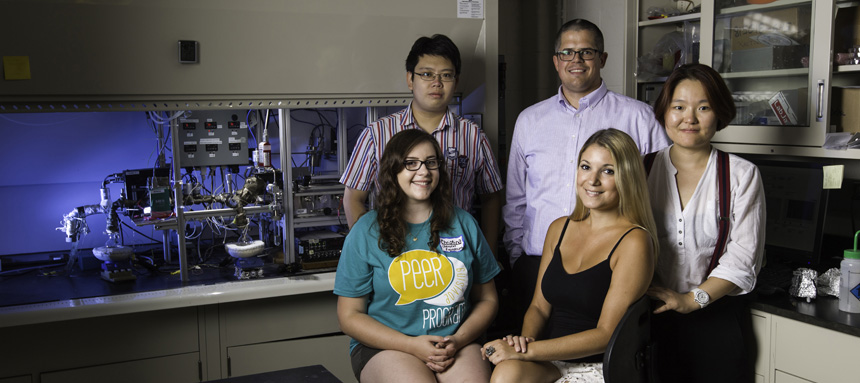A professor who puts students first

Wyatt Tenhaeff with students in his research lab.
When a professor shows a genuine interest in students. . . goes out of the way to explain class material in an interesting and understandable way. . . is readily available outside of class to answer questions. . . and even learns an extra computer language so students can focus on course content . . .
. . . Grateful students take notice.
And in the case of Wyatt Tenhaeff, assistant professor of chemical engineering, so does a grateful university.
That is why Tenhaeff is a recipient this year of the G. Graydon Curtis ’58 and Jane W. Curtis Award for Nontenured Faculty Teaching Excellence.
“From his very first semester teaching at the University of Rochester, Wyatt has demonstrated his remarkable teaching ability while simultaneously providing valuable research experiences for our undergraduates,” says Matthew Yates, professor and chair of chemical engineering.
Tenhaeff's students echo that sentiment.
“He is a large reason part of the reason I feel prepared to start my career as a chemical engineer,” says Melissa Becker. “Many of my classmates and I have the utmost respect for his incredible knowledge, ability, caring, and work ethic, the likes of which I find unparalleled amongst any professor I’ve had.”
“I have never had an advisor in any capacity who has been as involved in, dedicated to, and excited about the students’ work as Professor Tenhaeff,” says Christina Engler. “He is the reason I can move forward in my chemical engineering career.”
There are metrics to support this.
Tenhaeff, who joined the faculty in 2013, has taught a technically demanding undergraduate course in reactor design all five years. His overall course/instructor ratings have increased from 4.45/4.24 (out of 5) his first semester teaching to 4.73/4.73 in 2017, resulting in the highest ratings among all chemical engineering undergraduate classes the last two years.
Those scores are “particularly impressive” given the 60 or more students who typically enroll in the class, Yates says.
Tenhaeff has also voluntarily advised five senior design teams in the last three years and has supervised a half dozen undergraduate research assistants, three of whom have worked in his lab for several years.
(Tenhaeff’s research includes conventional lithium ion cell designs and developing new capabilities for next generation, post-lithium ion technologies. His lab also studies the use of initiated chemical vapor deposition to modify of interfacial behavior in lithium ion batteries using polymeric thin films.)
“Providing research experiences to undergraduate students requires a significant commitment of time,” Yates notes. “The number of undergraduate students working under Prof. Tenhaeff’s supervision is a testament to his dedication to mentoring and providing an enriching education experience to our undergraduate students.”
